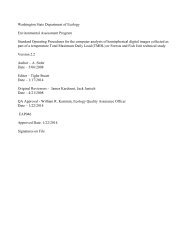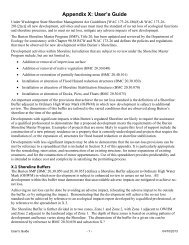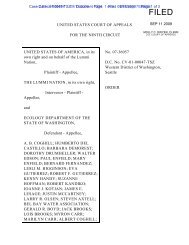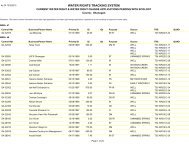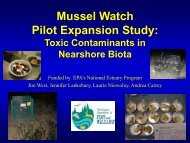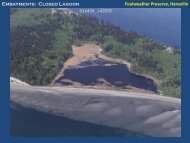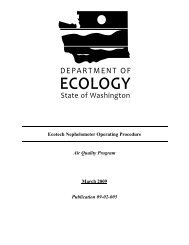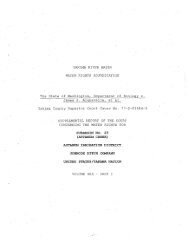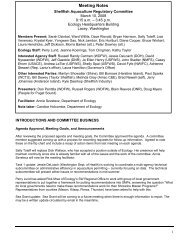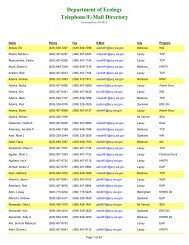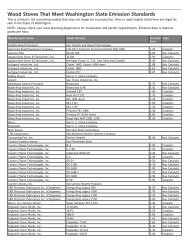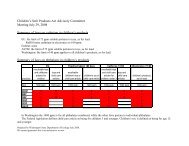General Permit for Biosolids Management - Washington State ...
General Permit for Biosolids Management - Washington State ...
General Permit for Biosolids Management - Washington State ...
You also want an ePaper? Increase the reach of your titles
YUMPU automatically turns print PDFs into web optimized ePapers that Google loves.
<strong>General</strong> <strong>Permit</strong> <strong>for</strong> <strong>Biosolids</strong> <strong>Management</strong> Page 19<br />
4.22. Appeals<br />
Any person may appeal this permit as provided by applicable law including, but not limited to, Chapter<br />
43.21B RCW and Chapter 34.05 RCW. Appeals of this permit must be made within 30 days of the<br />
issuance date listed on the cover page.<br />
Any person aggrieved by an Ecology decision made in accordance with this permit may appeal that<br />
decision as provided by applicable law including, but not limited to, Chapter 43.21B RCW and Chapter<br />
34.05 RCW.<br />
5. REQUIREMENTS FOR TRANSPORTING BIOSOLIDS<br />
If you transport biosolids, you must ensure that the transportation vehicle is properly cleaned prior to<br />
use of the vehicle <strong>for</strong> the transportation of food crops, feed crops, or fiber crops.<br />
5.1. Spill Prevention/Response Plan<br />
You must submit a spill prevention/response plan to Ecology that describes how you will attempt to<br />
prevent and respond to any spills. At a minimum, the plan must include the following:<br />
A list of contact names and numbers.<br />
An explanation of how and when a contact will be contacted.<br />
The role of each contact.<br />
How any spill will be cleaned up.<br />
If you contract <strong>for</strong> the transportation of your biosolids, a contractor’s plan is sufficient if the minimal<br />
requirements are met and Ecology has been provided a copy of the plan.<br />
The transportation of biosolids is otherwise subject to regulation by the <strong>Washington</strong> <strong>State</strong> Utilities and<br />
Transportation Commission under Title 81 RCW.<br />
6. REQUIREMENTS FOR STORING BIOSOLIDS<br />
Storage of biosolids must be conducted in a manner that is not likely to result in the contamination of<br />
ground water, surface water, air, or land.<br />
6.1. Exemptions<br />
If you store biosolids in a manner that meets the above minimum standards, your storage is exempt<br />
from the provisions of Subsections 6.2 and 6.3 if either of the following apply:<br />
You are storing in accordance with a current local, state, or federal water pollution control<br />
permit or other environmental permit.<br />
Your storage meets the definition of “temporary, small-scale storage” in this permit.<br />
6.2. Surface Impoundments (Lagoons)<br />
If you store your biosolids in a surface impoundment that was constructed and used by you <strong>for</strong> that<br />
purpose prior to July 1, 2007, the surface impoundment must meet the requirements <strong>for</strong> the design,<br />
construction, and operation of surface impoundments in Chapter 173-304 WAC or a higher standard.<br />
If you store your biosolids in a surface impoundment that was constructed or upgraded since July 1,<br />
2007, or you are proposing to use a surface impoundment <strong>for</strong> biosolids storage <strong>for</strong> the first time, the<br />
surface impoundment must meet the requirements <strong>for</strong> the design, construction, and operation of<br />
surface impoundments in Chapter 173-350 WAC or a higher standard.



